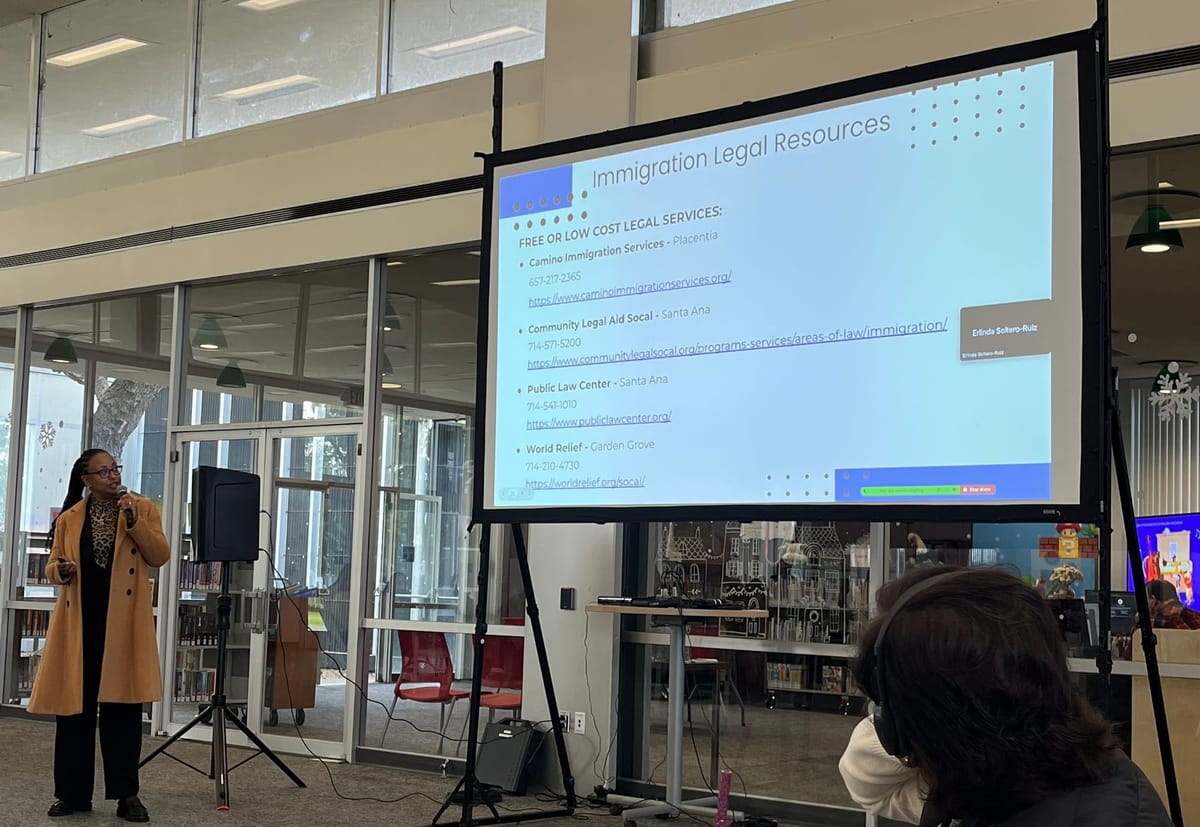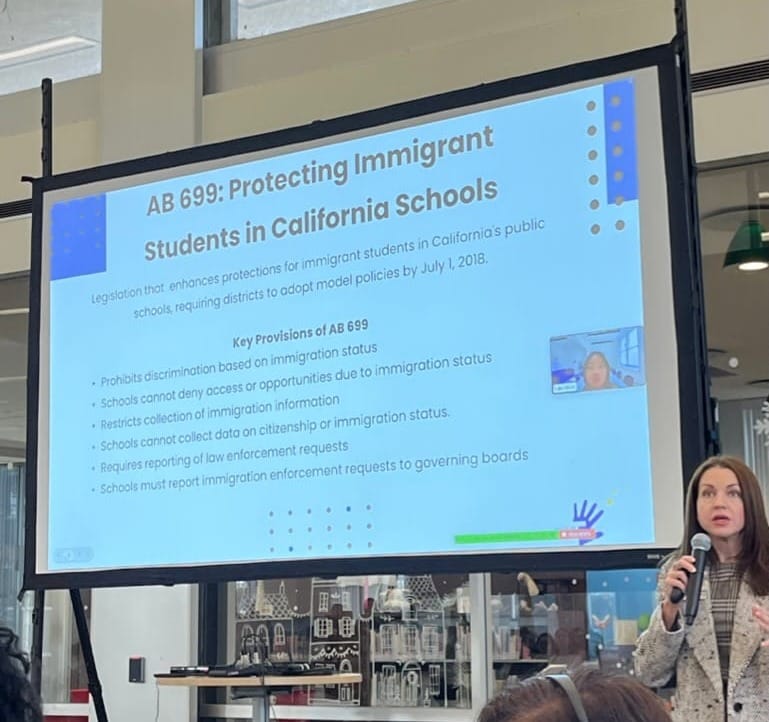O.C. School Districts Respond to Changing Federal Immigration Rules
Shift allowing Immigration and Customs Enforcement officers to conduct arrests at schools prompts concerns from families, action by educators.

President Donald J. Trump is issuing executive orders and changing policies to deliver on his campaign promise to carry out “the largest mass deportation operation in American history of illegal criminals,” as White House Press Secretary Karoline Leavitt reaffirmed this week.
One action directly impacts schools: Immigration and Customs Enforcement (ICE) officers are now allowed to make arrests and carry out operations on or near TK-12 campuses which is a shift in Department of Homeland Security policy.
“Criminals will no longer be able to hide in America’s schools and churches to avoid arrest,” a DHS statement from Jan. 21 reads.
Although it remains unclear whether school raids are planned, the idea of ICE operations near campuses has many families in Orange County, home to large immigrant communities, seeking guidance and support.
“Current immigration-related uncertainties have heightened concerns among students and families, potentially impacting their ability to engage in the educational process fully,” reads a recent school board agenda for the Santa Ana Unified School District (SAUSD).
According to the Migration Policy Institute, an estimated 12,000 school-aged children in Orange County lack legal status. Around 21% of children under the age of 18 have at least one parent who is undocumented, according to a 2019 USC Equity Research Institute study.
In response to community concerns, many of Orange County’s 28 public school districts and the Orange County Department of Education (OCDE) are emphasizing that all children, regardless of immigration status, are entitled to a public education under state and federal laws.
Some districts are offering workshops, legal guidance, and mental health resources while highlighting California’s legal protections for immigrant students.
'We will always stand with our students and families'
SAUSD, which serves around 36,000 students, reaffirmed its more than 50 schools as “safe havens” for students.
“We will always stand with our students and families facing any immigration enforcement,” SAUSD Superintendent Jerry Almendarez said in a Jan. 16 video.
The district has developed an “Immigration Support Plan,” which includes training staff on how to respond if immigration officials appear on campus. Staff are instructed to notify the superintendent and school site administrator, and record information about the officer and their request.

Each school district may have its own protocol, for instance, it may include contacting district lawyers. In general, ICE agents can only enter a campus with specific warrants signed by a judge, according to recent guidance from California Attorney General Rob Bonta. Legal battles may be forthcoming over the extent of schools’ authority to deny access to immigration officials.
California lawmakers have already proposed changes to state law in response to Trump’s actions, according to CalMatters. One bill, SB 98 or the Sending Alerts to Families in Education Act, would require parents, students, and school staff to be immediately notified if immigration officers are on campus.
The OCDE published this overview about the current legal protections for immigrant students. The department is monitoring federal developments.
“Recognizing that Orange County is home to many families with varying immigration statuses, we are closely examining federal policy changes related to immigration and their intersection with existing state laws,” Orange County Superintendent of Schools Stefan Bean, Ed.D., wrote in an email statement.
Dr. Bean, himself an immigrant to the U.S., emphasized the importance of compliance with both state and federal laws while ensuring schools remain safe and supportive environments "where every student can thrive."
'We Don't Collect Citizenship Information'
The Fullerton School District, a TK-8 district serving roughly 11,000 students at 20 campuses, has been proactive about responding to families' concerns. The district maintains a robust resource page and recently hosted workshops titled “Supporting Families with Immigration Concerns.”
At one meeting, FSD Superintendent Robert Pletka, Ed.D., reassured families of their rights and the district's commitment to their safety.
“We're here as advocates to make sure that you feel safe and know that we're here and will support you all the way through,” Dr. Pletka said, even sharing his personal phone number for families needing direct support.
Dr. Pletka stressed that the only information the school district needs to collect is confirmation of when a student was born, to know which grade to place them in, and proof that they live within the FSD boundaries.
“We don’t collect anything that shows whether or not somebody is a citizen, their immigration status,” Dr. Pletka said.

“If we don't collect any information about immigration, about citizenship, and we get a warrant from a federal magistrate that they're requesting that information, we are not going to be able to provide that information because we do not collect it,” Helene Morris, Ed.D., FSD’s Director of Administrative Services, said at the meeting.
Dr. Morris explained that the district does not share personal information with immigration enforcement and complies with California’s AB 699, a 2018 law which mandates privacy protections for immigrant students.
She advised parents to ensure their school forms are up to date regarding who is authorized to pick up their children in an emergency.
Two Fullerton Police officers were also on hand to dispel rumors. “The goal of the Fullerton Police Department is not immigration. That's a federal job,” Fullerton Police Captain Pedram Gharah said. “Our job is not to check immigration status on people. Our job is to provide safety.”
Bethany Anderson, an FSD parent and Director of Camino Immigration Services, an agency that offers counsel on immigration matters, warned families to watch for scams targeting immigrant communities. She advised families to have their passports in order and create child care plans in case of emergencies. The FSD is holding a workshop on Feb. 5 on how to make a Family Preparedness Plan.
Anderson also advised that if you are detained by an ICE officer, that you have the right to remain silent.
She urged families not to panic. “The media likes to sensationalize what's going on, and you're going to hear little bits and pieces of what is actually true,” she said, encouraging families to seek information from trustworthy sources like school districts.
"We are working together to create a safe, inclusive environment where every child feels secure and supported," FSD board member Vanesa Estrella wrote of the district's efforts in an email to Spotlight Schools. "These resources are not just helping individual families, we are strengthening our entire community."
The Anaheim Union High School District (AUHSD) also hosted a “Know Your Rights” webinar attended by more than 300 people.
Dulce Sotelo, a parent whose daughter attends an AUHSD campus, said students are aware of what's happening.
“Instead of talking about going to the mall, they are talking about immigration,” Sotelo shared in a phone interview.
While she appreciates the district’s efforts, she noted ongoing fear in the community. “There is a lot of worry about what could happen next,” she said. “We know that kids can’t learn when they are afraid,” noting the current climate affects all students, not just undocumented immigrants or students with relatives that lack legal status.
Orange County Board of Education Trustee Mari Barke, a supporter of President Trump, acknowledged the current uncertainty but said legal compliance is necessary.
“Under the supremacy clause, the federal government has complete authority over immigration and immigration enforcement,” she wrote in an email. “I think it's not only possible, but also important to follow both state and federal law.”
Barke expressed her commitment to keeping schools safe for every student. “I believe our schools are safe and that will not change.”
Sotelo encouraged parents to seek information and advocate for their children.
“Go to your [school] board meetings, speak to your board members, and ask about what protections are in place. There are laws to protect your students,” she said.
Germaine Neumann-Chau contributed reporting.
Editor's Note: This story was updated with a comment from a FSD board of education member.
